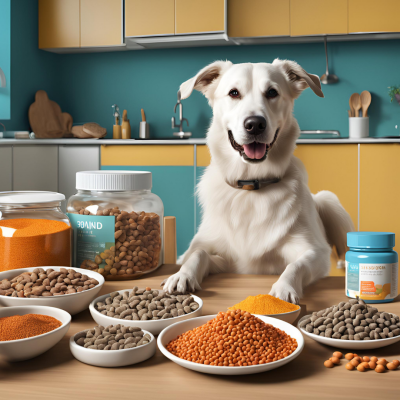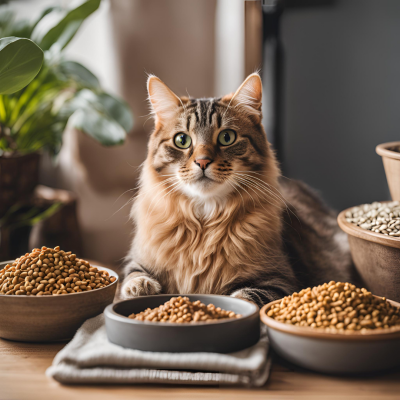Cats are naturally picky eaters, and their nutritional needs are significantly different from those of dogs. As a responsible cat owner, you want to ensure that your cat receives a balanced and nutrient-rich diet that supports their health and allows them to live a long, happy life. In this blog post, I will explain the key aspects of feline nutrition, discuss the different types of cat food, and help you make the best choice for your feline friend.
1. The unique nutritional needs of cats
Cats are obligate carnivores, which means they require a diet primarily composed of meat. Their digestive system is designed to efficiently process animal proteins and fats, while they can only minimally digest carbohydrates. Unlike dogs, cats need certain nutrients that are only found in animal products, such as taurine, vitamin A, and arachidonic acid.
a. Taurine: Taurine is an amino acid that is essential for the health of your cat's heart, eyes, and reproductive system. A lack of taurine can lead to severe health problems, including heart disease and blindness. Since cats cannot produce enough taurine on their own, it must be provided through their diet. High-quality cat food typically contains enough taurine to meet your cat's needs.
b. Vitamin A: Unlike dogs, cats cannot synthesize vitamin A from plant sources like carrots. They must obtain it directly from animal sources such as liver or fish. Vitamin A is crucial for vision, the immune system, and skin health in cats.
c. Arachidonic acid: Arachidonic acid is an essential fatty acid found in animal fats. It plays a key role in inflammation regulation, skin health, and immune system function. This nutrient must also be obtained through the diet.
2. Different types of cat food and their pros and cons
There are many types of cat food available on the market, and each type has its own advantages and disadvantages. The right choice of food depends on your cat's individual needs, as well as their age, health, and preferences.
a. Dry food (Kibble): Dry food is convenient and has a long shelf life. It can help keep your cat's teeth clean, as chewing helps clean the surfaces of the teeth. However, dry food contains less moisture, which can lead to dehydration in cats that do not drink enough water. Make sure your cat always has access to fresh water, especially if they primarily eat dry food.
b. Wet food (Canned food): Wet food has a high moisture content, which is especially important for cats that tend to drink little water. It is often more palatable and is more readily accepted by picky cats. Wet food is also suitable for older cats or those with dental issues, as it is easier to chew. However, wet food is less durable after opening and must be stored in the refrigerator.
c. Raw food (BARF): The Biologically Appropriate Raw Feeding (BARF) diet for cats consists of raw meat, bones, and organs. Proponents argue that raw food is closest to a cat's natural diet and leads to better health and a shinier coat. However, BARF requires careful planning to ensure all necessary nutrients are present in sufficient quantities. Improperly composed raw diets can lead to nutrient deficiencies and health issues.
d. Homemade cat food: Some cat owners choose to prepare their cat's food themselves to have control over the ingredients. This can be healthy if done correctly but requires a thorough understanding of the nutritional needs of cats. It is important to use recipes that have been reviewed by a veterinary nutritionist or veterinarian to ensure that all nutrients are present in the correct ratios.
3. Special dietary needs in cats
Cats may have special dietary needs depending on their age, health status, or specific circumstances like pregnancy. Here are some common scenarios where dietary adjustments may be necessary:
a. Kittens: Kittens need food that is rich in energy, protein, and nutrients to support their rapid growth. Special kitten food is optimally designed to meet the needs of young cats and helps them grow strong and healthy.
b. Older cats: Older cats often have a lower energy requirement and need food that contains fewer calories but still provides all necessary nutrients. It may also be beneficial to supplement their diet with omega-3 fatty acids to support joint health.
c. Overweight cats: Obesity in cats can lead to a range of health problems, including diabetes, joint issues, and heart disease. For overweight cats, there are special diet foods that contain fewer calories but are still satisfying.
d. Cats with kidney problems: Cats with kidney disease require a diet that has reduced protein content and lower phosphorus levels to ease the burden on the kidneys. There are special renal diets developed for these animals.
4. Signs of a healthy diet in cats
As with dogs, it is important to monitor your cat's health to ensure they are receiving the right nutrition. Signs of a healthy cat include:
- Shiny coat and healthy skin: A well-nourished cat has a shiny, soft coat and healthy, flake-free skin.
- Ideal body weight: A healthy cat has a visible waist, and their ribs are palpable but not visible.
- Normal digestion: Regular, well-formed stools are a sign of healthy digestion.
- Energy and activity: A healthy cat is active, curious, and shows no signs of lethargy.
- Clear, bright eyes: Healthy cats have clear eyes with no signs of cloudiness or discharge.
5. Conclusion: Ensuring your cat is optimally nourished
Your cat's diet is the key to their health and well-being. It is important to choose food that meets your cat's specific needs, whether in the form of dry food, wet food, or homemade meals. Be sure to monitor your cat's eating habits and behavior to ensure they remain healthy. At Dorfzauber.de, you will find a wide selection of high-quality cat food that will help your cat live a long and happy life.
By understanding the specifics of feline nutrition and addressing your cat's individual needs, you contribute significantly to their well-being. Pamper your cat with the best food and watch them thrive!


